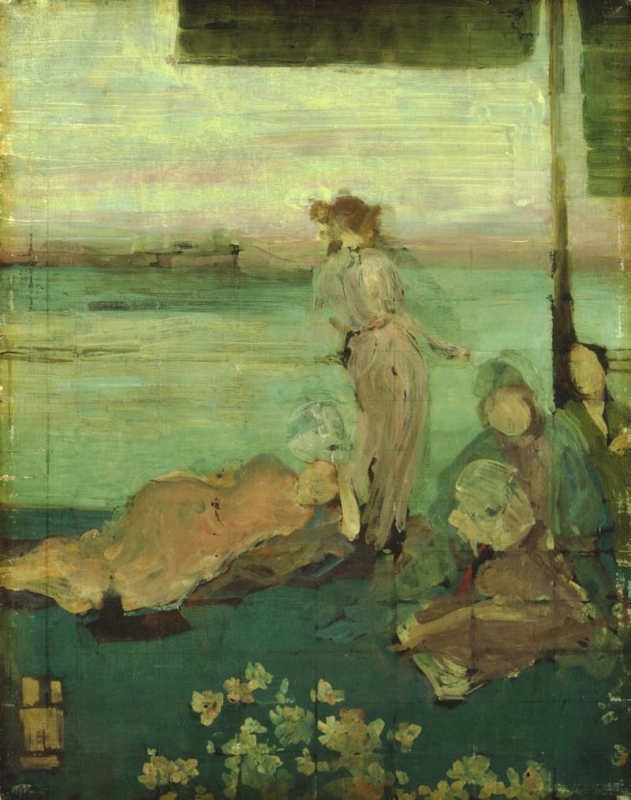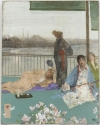1867: The earliest possible date for Sketch for 'The Balcony' is the early summer of 1867, when Whistler wrote to Ignace-Henri-Jean-Théodore Fantin-Latour (1836-1904): 'Je t'envoies une photographie d'apres la petite esquisse du 'balcon' - Je vais le faire grand presque comme nature pour le salon - Dis moi ce que [tu] en penses pour composition, lignes etc ... la couleur en est tres éclatante.' 1 (Translation: 'I send you a photograph of the little study of the 'balcony' - I am going to make it almost life-size for the salon - Tell me what you think of it as to composition, lines etc ... the colour of it is very brilliant.') This might refer to Sketch for 'The Balcony', although it is usually assumed that it referred to the more finished composition, Variations in Flesh Colour and Green: The Balcony [YMSM 056].
1864-1871: Whistler had framed his full signature in a rectangular cartouche on another Asian subject, Purple and Rose: The Lange Leizen of the Six Marks [YMSM 047], which dates from 1864. He first used a butterfly monogram, derived from his initials 'JW', in Venus [M.0357] in 1869. In 1871 oils such as Nocturne: Blue and Silver - Chelsea [YMSM 103] were signed with the butterfly on a rectangular cartouche, for exhibition.
1869/1870: Sketch for 'The Balcony' incorporates a cartouche (but no signature or butterfly) and flowers in the lower left-hand corner. These were painted in the foreground while the paint underneath was still wet, which implies that they are not a later addition, and that Sketch for 'The Balcony' dates from after 1869. Sketch for 'The Balcony' was originally very similar in colour and composition to Variations in Flesh Colour and Green: The Balcony. The 'squaring' visible on the 'Sketch' could have been intended for transferring or enlarging the composition, perhaps revisiting the plan to enlarge the composition to life-size, as mentioned to Fantin-Latour in 1867.
1870: By the spring of 1870 Whistler had apparently abandoned or postponed the idea of enlarging the original study. The 'Sketch' could have been used as part of Whistler's preparations for completing Variations in Flesh Colour and Green: The Balcony, which was sent to the Royal Academy of Arts for exhibition in May 1870, and was probably signed at that time with a butterfly on the cartouche in the lower left corner.
Andrew McLaren Young (1913-1975) pointed out that there is a major difference in spirit between Variations in Flesh Colour and Green: The Balcony and Sketch for 'The Balcony'. In the 'sketch', he wrote, 'though posed almost identically, the figures are, with their occidental waists and curves, much more Greek than Japanese' and he thought that 'the sketch – and the rethinking of which it is a token ... inspired the alterations to the picture [Variations in Flesh Colour and Green: The Balcony] ... that went to the 1870 Royal Academy.' 2
1870/1872: There are other possibilities. For instance, the Sketch for 'The Balcony' could have been painted or substantially reworked after the exhibition of Variations in Flesh Colour and Green: The Balcony in 1870, and represent a re-think of the composition, which, in any case, was not carried out.
Last updated: 28th December 2020 by Margaret







